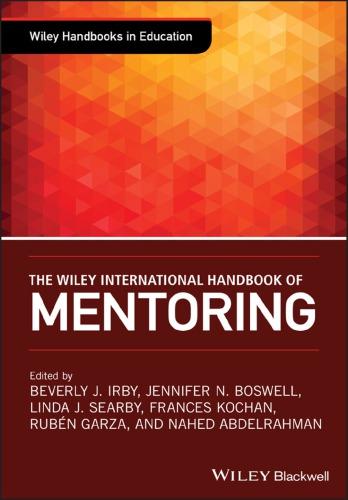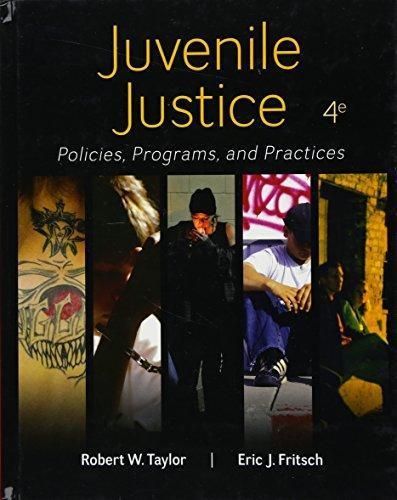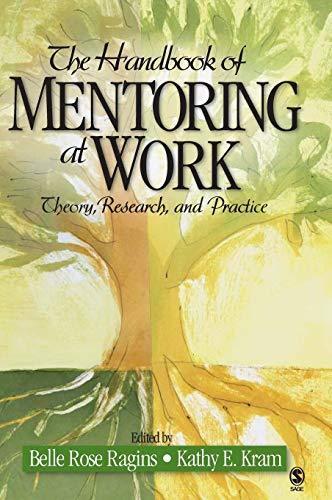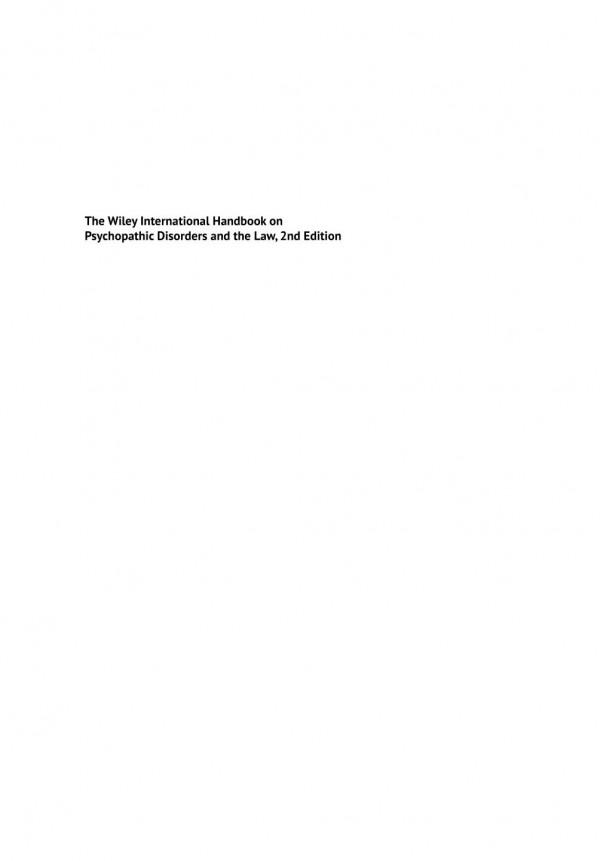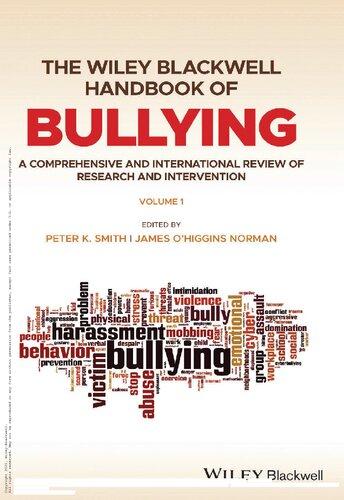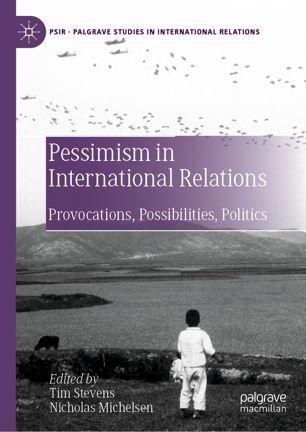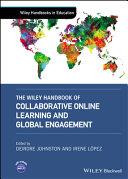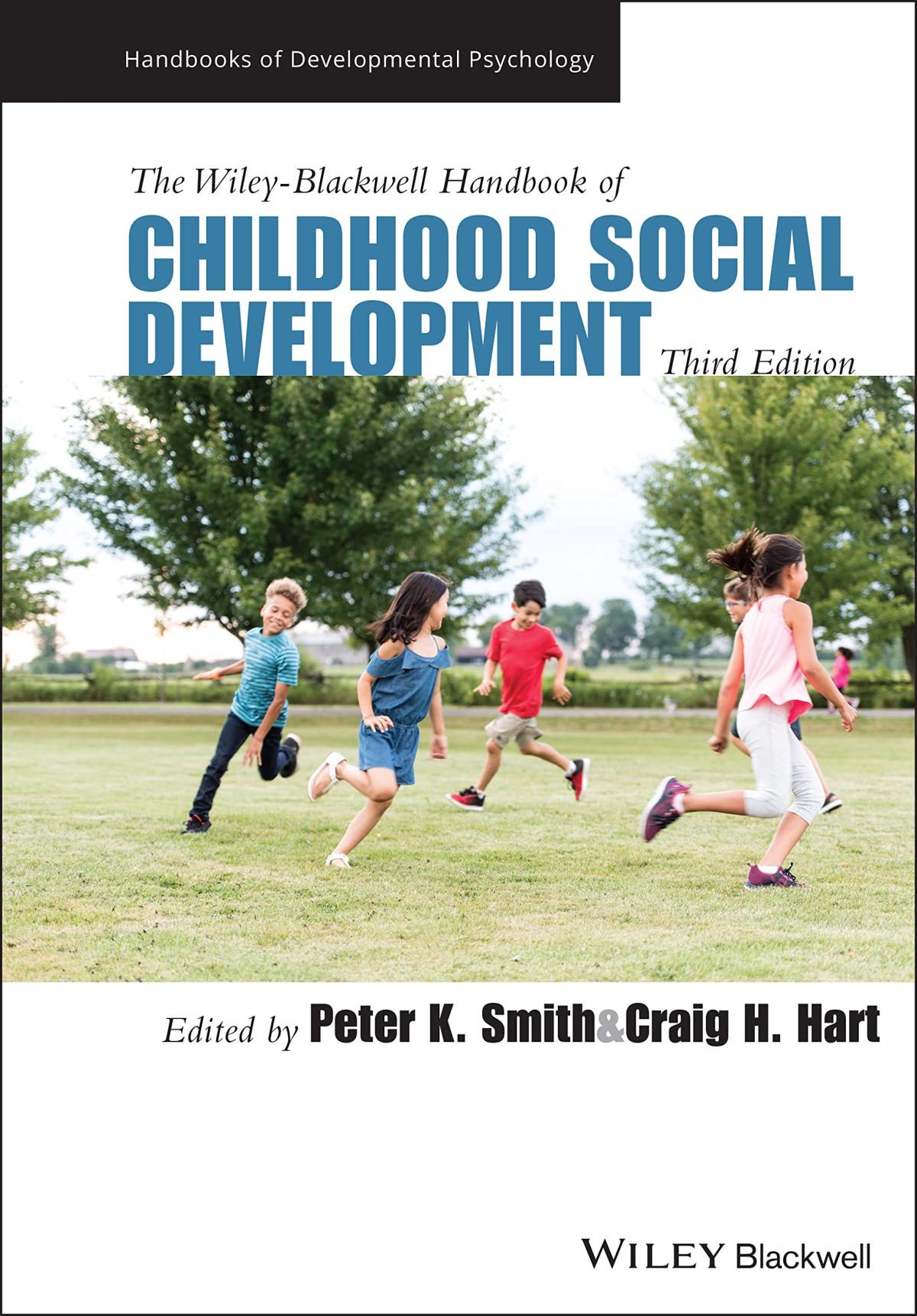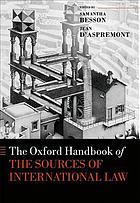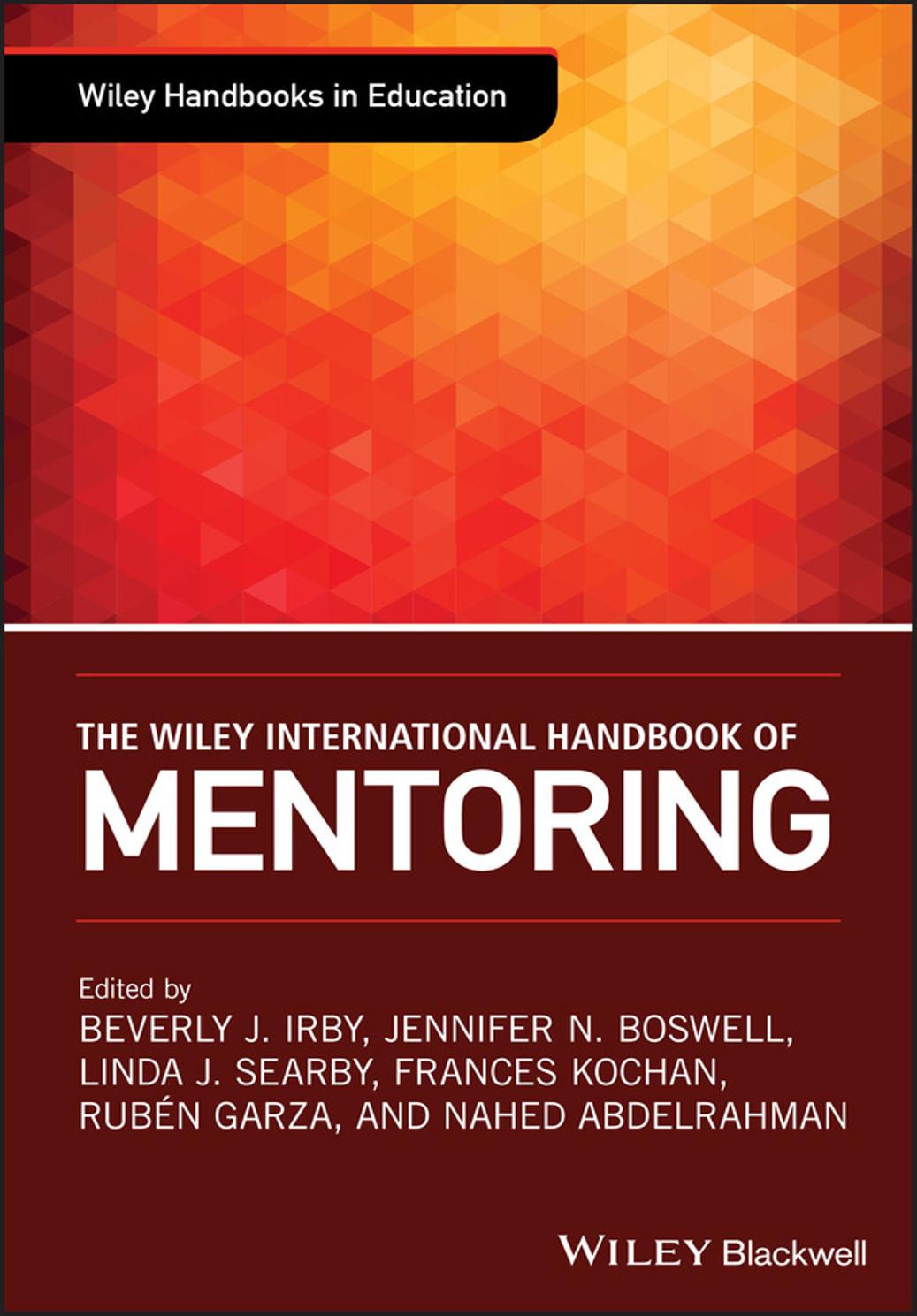The Wiley International Handbook of Mentoring
Paradigms, Practices, Programs, and Possibilities
Edited by
Beverly J. Irby
Jennifer N. Boswell
Linda J. Searby
Frances Kochan
Rubén Garza
Nahed Abdelrahman
This edition first published 2020 © 2020 John Wiley & Sons, Inc.
All rights reserved. No part of this publication may be reproduced, stored in a retrieval system, or transmitted, in any form or by any means, electronic, mechanical, photocopying, recording or otherwise, except as permitted by law. Advice on how to obtain permission to reuse material from this title is available at http://www.wiley.com/go/permissions.
The right of Beverly J. Irby, Jennifer N. Boswell, Linda J. Searby, Frances Kochan, Rubén Garza, and Nahed Abdelrahman to be identified as the authors of the editorial material in this work has been asserted in accordance with law.
Registered Office
John Wiley & Sons, Inc., 111 River Street, Hoboken, NJ 07030, USA
Editorial Office 101 Station Landing, Medford, MA 02155, USA
For details of our global editorial offices, customer services, and more information about Wiley products visit us at www.wiley.com.
Wiley also publishes its books in a variety of electronic formats and by print‐on‐demand. Some content that appears in standard print versions of this book may not be available in other formats.
Limit of Liability/Disclaimer of Warranty
While the publisher and authors have used their best efforts in preparing this work, they make no representations or warranties with respect to the accuracy or completeness of the contents of this work and specifically disclaim all warranties, including without limitation any implied warranties of merchantability or fitness for a particular purpose. No warranty may be created or extended by sales representatives, written sales materials or promotional statements for this work. The fact that an organization, website, or product is referred to in this work as a citation and/or potential source of further information does not mean that the publisher and authors endorse the information or services the organization, website, or product may provide or recommendations it may make. This work is sold with the understanding that the publisher is not engaged in rendering professional services. The advice and strategies contained herein may not be suitable for your situation. You should consult with a specialist where appropriate. Further, readers should be aware that websites listed in this work may have changed or disappeared between when this work was written and when it is read. Neither the publisher nor authors shall be liable for any loss of profit or any other commercial damages, including but not limited to special, incidental, consequential, or other damages.
Library of Congress Cataloging‐in‐Publication Data
Names: Irby, Beverly J., editor.
Title: The Wiley international handbook of mentoring : paradigms, practices, programs, and possibilities / edited by Beverly J. Irby, Jennifer N. Boswell, Linda J. Searby, Frances Kochan, Rubén Garza, Nahed Abdelrahman.
Other titles: Handbook of mentoring
Description: Hoboken, NJ, USA : John Wiley & Sons, Inc., [2020] | Series: Wiley handbooks in education | Includes bibliographical references and index.
Identifiers: LCCN 2019018764 (print) | LCCN 2019022111 (ebook) | ISBN 9781119142881 (hardcover)
Subjects: LCSH: Mentoring in education. | Mentoring in education–Case studies.
Classification: LCC LB1731.4 .W55 2020 (print) | LCC LB1731.4 (ebook) | DDC 371.102–dc23
LC record available at https://lccn.loc.gov/2019018764
LC ebook record available at https://lccn.loc.gov/2019022111
Cover Design: Wiley
Cover Image: © Leysan/Getty Images
Set in 10/12pt Warnock by SPi Global, Pondicherry, India
Contents
Preface ix
Notes on Contributors xv
Section I Mentoring Paradigms 1
Beverly J. Irby and Rubén Garza, Section Editors
1 Defining Mentoring: An Elusive Search for Meaning and a Path for the Future 3
Nora Dominguez and Frances Kochan
2 Epistemological Beginnings of Mentoring 19
Beverly J. Irby, Nahed Abdelrahman, Rafael Lara‐Alecio, and Tammy Allen
3 Social Capital as Mentoring: A New Paradigm in Action 29
John M. Heffron
4 Mentoring in the Human Resource Development Context 45
Shinhee Jeong and Sunyoung Park
5 Constructivism and Mentoring 65
Arthur Shapiro
6 Mentoring as Loose Coupling: Theory in Action 79
Susan Brondyk
7 Relational Mentoring for Developing Novice Principals as Leaders of Learning 97
Sonya Hayes
8 Mentoring in a Globally Active Learning Context: Initiation, Engagement, Implementation, and Aftermath
Carol A. Mullen 115
9 Synthesis of Mentoring Paradigms 137
Rubén Garza and Beverly J. Irby
Section II Mentoring Practices 141
Linda J. Searby, Section Editor
10 Mentoring Within Communities of Practice 143
SueAnn I. Bottoms, Jerine Pegg, Anne Adams, Hilary Smith Risser, and Ke Wu
11 Mentoring Women Faculty of Color in the Academy 167
Brenda Lloyd‐Jones and Gaëtane Jean‐Marie
12 The Mentoring Mindset: Desired Practices of a Protégé in a Mentoring Relationship 187
Linda J. Searby
13 Collaborative Learning and Knowledge‐Sharing: The Potential of New Administrator Networks and Mentoring Programs 205
Catherine M. Hands, Denise E. Armstrong, and Carol Mitchell
14 Faculty‐Inspired Strategies for Early Career Success Across Institutional Types: The Role of Mentoring 223
Vicki L. Baker, Leslie D. Gonzales, and Aimee LaPointe Terosky
15 Practices of Cognitive Apprenticeship and Peer Mentorship in a Cross‐Global STEM Lab 243
Carol A. Mullen
16 Professional Knowledge of Teaching and the Online Mentoring Program: A Case Study in the Brazilian Educational Context 261
Aline M. de M. R. Reali, Maria da Graça N. Mizukami, and Regina M. S. P. Tancredi
17 Synthesis of Mentoring Practices 279
Linda J. Searby
Section III Mentoring Programs 283
Jennifer N. Boswell, Section Editor
18 The College Mentoring Experience—A Hong Kong Case Study 285
Barley Mak
19 Who Mentors Me? A Case Study of Egyptian Undergraduate Students 309
Nahed Abdelrahman, Beverly J. Irby, Hamada El Farargy, Rafael Lara‐Alecio, and Fuhui Tong
20 Mentoring Faculty for Quality Enhancement in Indian Higher Education 327
Ankur Gupta
21 National Principal Mentor Program 353
Carol A. Riley
22 Educational Counselors as Leaders in Developing Personal and Communal Resilience 367
Heidi Flavian and Efrat Kass
23 Training Teachers in Academic Mentoring Practices: Empirical Foundations and a Case Example 383
Simon Larose and Stéphane Duchesne
24 Closing the Mentorship Loop 397
Susan Ferguson, Andrea Kent, and André Green
25 Roots to Wings–A Transformative Co‐Mentoring Program to Foster Cross‐Cultural Understanding and Pathways into the Medical Profession for Native and Mexican American Students 409
Mirna I. Ramos‐Diaz, Maxine Brings Him Back‐Janis (Lako Wechokun Gluha Mani Win), Henry M. Strom (Stahobi), Bernadette Howlett, Ann M. Renker, and Davis E. Washines (Yellowash)
26 Synthesis of Mentoring Programs 427
Jennifer N. Boswell
Section IV Mentoring Possibilities 433
Frances Kochan, Section Editor
27 Mentoring Policies: Possibilities, Challenges, and Future Directions 435
Göran Fransson
28 The Power, Politics, and Future of Mentoring 453
Geraldine Mooney Simmie
29 Mentoring Across Race, Gender, and Generation in Higher Education: A Cross‐Cultural Analysis 471
Frances Kochan and Sydney Freeman, Jr.
30 Realizing the Power of Mentoring 487
Jane Kirkby and Lucas Walsh
31 On the Threshold of Mentoring: Recognizing and Negotiating the Liminal Phase 503
David Starr‐Glass
32 ONSIDE Mentoring: A Framework for Supporting Professional Learning, Development, and Well‐Being 521
Andrew J. Hobson
33 Brain‐Based Mentoring to Help Develop Skilled and Diverse Communities 547
Ellen Weber
34 Dynamic Model of Collaborative Mentorship: Agency, Values, Engagement, Patterns, and Roles 567
Barbara Trube, Dianne Gut, Pam Beam, and Beth VanDerveer
35 Synthesis of Mentoring Possibilities 583
Frances Kochan
Index 587
Preface
The Wiley International Handbook of Mentoring: Paradigms, Practices, Programs, and Possibilities is presented as a text in which international authors offer commentaries and share interpretations on the components of mentoring in today’s networked world society with varied cultural vantage points. This internationally focused Handbook serves to deepen the understanding and implementation of mentoring. Furthermore, it is our hope that the Handbook validates mentoring in any culture, (a) aids one’s chances of promotion on the job or completion of a task, (b) provides socialization and assimilation into one’s respective profession or new position, (c) facilitates success in maneuvering through personalities, politics, policies, and procedures, (d) gives women and/or individuals from diverse groups value‐added and equitable access to resources and information, (e) improves diversity initiatives, (f) addresses skill and knowledge gaps, (g) develops leaders, (h) increases employee commitment, participation, and retention, (i) helps build one’s network, and (j) offers one different views of situation or helps one see different avenues to approach challenges.
Why Is Mentoring Important?
Mentoring appears to be more important than ever before, particularly from an international perspective. We believe this is due to the interconnectedness of societies around the world via instant communications. Due to this situation, there is a need to understand other cultures better in order to impact the social good and global economic outcomes. Mentoring can aid in such understandings via the mere basis of mentoring, and that is the development of empathic relationships.
We acknowledge that mentoring is actualized in a world of uncertainty. There is uncertainty in terms of time—it seems there is less time for professional priming and succession planning; there is uncertainty in terms of resources—it seems there are shrinking budgets for professional development and advanced training; and there is uncertainty in the mental health of many youth—it seems there is a lack of sophistication or naivety in terms of building strong structures for increasing human capacity. Therefore, effective personal mentoring and mentoring programs become even more important than ever in a world of resource deprivation and uncertainty.
Hong
What the International Handbook Offers
The Handbook provides the first collection in the area of mentoring in which the authors and editors apply theory to practice and research, programs, and recommendations from an inclusive, international perspective. Such a collection should enable readers to put theory into action, while considering cultural contexts and laying a theoretical foundation for further research internationally. This Handbook includes a panorama of introspections on mentoring from international scholars and practitioners who will contribute as a global collective with perspectives from 14 countries and 6 continents (Figure 1).
Construct and Structure
Rather than having an introduction to sections, the reader will find that each section includes a final synthesis chapter authored by the section editor(s) that captures the essence of the lessons learned within a global mentoring context, along with research avenues recommended for further exploration. As a content analysis and synthesis of the chapters within each section, it is itself a culturally attuned research endeavor. This makes the Handbook totally unique from any other, which may make it an appropriate and essential volume for a global readership and for those teaching mentoring courses, for trainers, and for researchers and practitioners in a variety of fields such as business, education, government, politics, sciences, industry, or sports. The book also differs from other volumes, because it moves from the theoretical foundations of mentoring to mentoring
Figure 1 Countries of Perspectives of Contributing Scholars
Preface xi programs, to best practices in mentoring, and finally to the future possibilities of mentoring. There is no other handbook volume that has this type of sequencing with an international composition. The four sequences of the book are: (a) mentoring paradigms, (b) mentoring practices, (c) mentoring programs, and (d) mentoring possibilities. Each is discussed as follows.
Section I: Mentoring Paradigms
First, we briefly introduce paradigms and disciplines. Kuhn (1962) reintroduced a most influential concept, that of a paradigm, which he put forward as a set of practices that define a scientific discipline at any particular period of time. Certainly, there are paradigms with sets of practices in the field of mentoring which come with their own vocabulary, operational definitions, purposes, strategies, outcomes, theoretical structures, programs, methods, and standards. Kuhn includes the term, “discipline,” within the concept of paradigm.
Riggio (2013) indicated that there is not a clear answer as to what specifically defines an academic discipline. However, he did state that a discipline emerges with consensus. He stated “Consensus refers to shared agreement about: (1) a circumscribed knowledge base, (2) research methodology, (3) content and procedures for training, and (4) professional, scholarly journals and association(s)” (p. 10). Mentoring is poised as an emergent discipline as it (a) has a set of practices that define it, (b) has a defined knowledge based with at least 20 years of published knowledge within a journal that is focused only on the topic of mentoring and within similarly focused published books, (c) has published studies using quantitative and/or qualitative methods grounded in the social sciences, (d) has content and procedures for training, and (e) has professional, scholarly journals, and associations.
Within the past 35 years since Kram’s (1985) book, Mentoring at Work: Developmental Relationships in Organizational Life, numerous paradigms of mentoring have emerged. We contend that from an epistemological, paradigmatic perspective, mentoring has materialized over time as a way of knowing— knowing the other and knowing oneself; knowing when to mentor, when to decline, and when to be mentored; knowing what to say and what to do in a mentoring dyad or group; knowing who to mentor; knowing who should be a mentor; knowing where to mentor; and knowing how to mentor and how often to mentor or be mentored. Just as Kuhn proposed that major epistemological changes, or paradigm shifts, take a social revolution, we propose that the paradigm of mentoring with the past three decades of research, practice, and work in the field has been pushed forward, not so much by a social revolution but by a professional movement and consensus. We believe that the mentoring paradigms presented within this Handbook will further the core knowledge on mentoring, pushing it further toward a discipline. Thus, it is an appropriate topic with which to begin the Handbook. This section on Mentoring Paradigms should lead readers to a basic understanding of mentoring from the vistas of the authors who hail originally from Canada, Egypt, Guatemala, South Korea, and the United States.
Section II: Mentoring Practices
Practices, or sets of practices, are components of a paradigm and of a discipline. It is therefore appropriate to provide global examples of mentoring practices that have proven to be successful and those that are promising new innovations. A search on Google related to mentoring practices or practices of mentoring yielded over 5 million hits and in a search of large databases on the topic of mentoring practices, there were 3,383 articles, 317 text sources, 268 books, 247 reviews, and 181 conference proceedings. From a global perspective, authors from Brazil, Canada, Haiti, and the United States share practices of mentoring with the following general topics: practices related to mentoring new faculty; mentoring as a community of practice; mentoring practices among women of color; practices for mentoring protégés; collaborative practices in mentoring; cross‐cultural practices; online mentoring, practices in mentoring principals, and mentoring practices in higher education and community colleges.
Section III: Mentoring Programs
Section III houses information on programs of mentoring. Herein, international authors describe mentoring programs that have had a significant impact upon the field and those that have been designed to meet the unmet needs and underserved populations. This area of practice in mentoring brings up over 22 million sites on a Google search, and in a search of large databases in the Texas A&M University libraries on the topic of mentoring programs, there were 8,764 citations. The contributors for this section hail originally from Canada, Egypt, Hong Kong‐China, India, Israel, and the United States, and they share a variety of successful international programs related to mentoring college students, faculty, peers, principals, high school students, and teachers.
Section IV: Mentoring Possibilities
Section IV, Possibilities, is comprised of authors who delve into the realm of the future by exploring groundbreaking approaches to mentoring, which could further the field and the concepts of mentoring programs and relationships. The international scholars from Australia, England, Ireland, Sweden, and the United States challenge the readers on topics of brain‐based mentoring, international social action mentoring, e‐mentoring, politics of mentoring, mentoring and racism, liminality, how to determine best practices in mentoring, judgmentoring, techniques of mentoring, and sociopolitical mentoring.
Conclusion
It is our hope that this Handbook provides further guidance related to mentoring. Additionally, we hope that it offers an international perspective that spurs ongoing discussion and thought‐provoking arguments for moving mentoring
Preface xiii
into a discipline of its own. Again, in order to be a discipline, mentoring already could be considered as such as we have demonstrated in this collection alone— because it (a) has a set of practices that define it, (b) has a defined knowledge based with over 20 years of published knowledge within a journal that is focused only on the topic of mentoring and within similarly focused published books, (c) has published studies using quantitative and/or qualitative methods grounded in the social sciences, (d) has content and procedures for training, and (e) has professional, scholarly journals, and associations.
Beverly J. Irby
References
Kram, K. E. (1985). Mentoring at work: Developmental relationships in organizational life. Glenview, IL: Scott Foresman.
Kuhn, T. (1962). The structure of scientific revolutions. (1st ed.). Chicago, IL: The University of Chicago Press.
Riggio, R. E. (2013). Advancing the discipline of leadership studies. The Journal of Leadership Education, 12(2), 10–14. doi: 10.12806/V12/I3/C2
Notes on Contributors
The Editors
Beverly J. Irby is Regents Professor and the Associate Dean of Academic Affairs at the College of Education and Human Development at Texas A&M University. Dr. Irby is also the Director of the Educational Leadership Research Center. Her primary research interests center on issues of social responsibility, including bilingual and English‐as‐ a‐second‐language education, administrative structures, curriculum, and instructional strategies. She is the author of more than 200 refereed articles, chapters, books, and curricular materials for Spanish‐speaking children. She has had access of $20,000,000 in grants. She also has held another Regents Professor title from another university system, the Texas State University System. Dr. Irby has had extensive experiences working with undergraduate students in the past 25+ years, and many of these students are underrepresented, including first‐generation college students, ethnic minority, and economically advantaged, who have obtained doctorate and received research/teaching awards under her mentorship. Dr. Irby is the editor of the Mentoring and Tutoring Journal.
Jennifer N. Boswell is Associate Professor and the Chair of the Clinical and Mental Health Counseling at the University of St. Thomas. Prior to that position, she was Associate Professor at the University of Houston at Victoria, Texas. Dr. Boswell has served as the Assistant Editor of the Mentoring and Tutoring Journal for six years and as Assistant Editor of Advancing Women in Leadership Journal for seven years. She also served as the Editor of the Michigan Journal of Counseling: Research, Theory, and Practice (Michigan Counseling Association). She has her PhD in Counselor Education from Sam Houston State University in Huntsville, Texas. In her work, she practices mentoring techniques and teaches such. Her current research focuses on the mentoring needs of women in counselor education programs. As well, Dr. Boswell is a published author with an average of three papers per year and has made numerous presentations at state, national, and international mental health conferences.
Linda J. Searby is Associate Clinical Professor of Educational Leadership at the University of Florida, where she teaches courses in Leadership and Administration, Curriculum and Supervision, Action Research, School Change, and Mentoring. She is the Co-Editor for the International Journal of Mentoring and Coaching in
Education, and a reviewer for several journals in educational leadership. Dr. Searby has published over 30 peer-reviewed articles in mentoring research, specifically on the development of a mentoring mindset in the protégé, as well as conducted numerous presentations and trainings for mentors and protégés, including many in other colleges at University the of Florida. She is co-editor of the books, Best Practices in Mentoring for Teacher and Leader Development (2016), and The Wiley International Handbook of Mentoring (2019). Dr. Searby is a graduate of Lincoln Christian University (BA), Eastern Illinois University (MS), and Illinois State University (PhD). Dr. Searby is a member of the Executive Board of the International Mentoring Association, and was instrumental in bringing the association to its new home at the University of Florida in 2018, and chaired its International Mentoring Conference here in March, 2019. Most recently, Dr. Searby has formed an Affinity Group at UF for faculty and staff who work with mentoring programs across campus.
Frances Kochan is the Wayne T. Smith Distinguished Professor, Emerita, Auburn University, AL. She has authored or co‐authored 10 books, published over 100 journal articles and book chapters, and presented at over 200 venues. She is editor of the Perspectives in Mentoring Series published by Information Age Press. Dr. Kochan was co‐chair of the American Educational Research Association Special Interest Group and served on the International Mentoring Association Board of Directors. Her research focuses on cultural aspects of mentoring and creating collaborative partnerships for leadership development and student success (kochafr@auburn.edu).
Rubén Garza is Assistant Dean for the College of Education and Professor in the Department of Curriculum and Instruction at Texas State University. He is a past Chair and Program Chair of the Mentoring and Mentoring Practices Special Interest Group of the American Educational Research Association. He has presented his research at state and national conferences and his work has been published in national and international journals. His research interests include mentoring, Latino education, caring, and culturally responsive pedagogy.
Nahed Abdelrahman is the Coordinator of the Preparing Academic Leaders (PAL) project. She is a researcher in Educational Administration at the Department of Educational Administration and Human Resources. Her research interests center on education policy and principal preparation. She was selected as a Barbara Jackson Scholar from 2015 to 2017. She authored and co‐authored several publications related to education policy such as Arab Spring and Teacher Professional Development in Egypt, A Website Analysis of Mentoring Programs for Latina Faculty at the 25 Top‐Ranked National Universities, Women and STEM: A Systematic Literature Review of Dissertation in Two Decades (1994–2014). She presented her research in conferences including in American Educational Research Association (AERA), University Council for Educational Administration (UCEA), Research on Women and Education (RWE), and The Universality of Global Education Issues Conference. She plays leadership roles in higher education as she serves as the president of Graduate Representative Advisory Board
and a committee member in two committees of the Graduate and Professional Student Council at Texas A&M University: Award Committee and Graduate Appeals Panel. She currently serves as the Assistant Editor of the Mentoring and Tutoring Journal, Advancing Women in Leadership, and Dual Language Research and Practice.
The Contributors
Nahed Abdelrahman is the Coordinator of Preparing Academic Leaders (PAL) project. She is a researcher in Educational Administration at the Department of Educational Administration and Human Resources. Her research interests center on education policy and principal preparation. She was selected as a Barbara Jackson Scholar from 2015 to 2017. She authored and co‐authored several publications related to education policy such as Arab Spring and Teacher Professional Development in Egypt, A Website Analysis of Mentoring Programs for Latina Faculty at the 25 Top‐Ranked National Universities, Women and STEM: A Systematic Literature Review of Dissertation in Two Decades (1994–2014). She presented her research in conferences including in American Educational Research Association (AERA), University Council for Educational Administration (UCEA), Research on Women and Education (RWE), and The Universality of Global Education Issues Conference. She plays leadership roles in higher education as she serves as the president of Graduate Representative Advisory Board and a committee member in two committees of the Graduate and Professional Student Council at Texas A&M University: Award Committee and Graduate Appeals Panel. She currently serves as the Assistant Editor of the Mentoring and Tutoring Journal, Advancing Women in Leadership, and Dual Language Research and Practice.
Anne Adams’ research focuses on the development of student mathematical reasoning and argument and on developing teachers’ ability to support student reasoning. She has been awarded funding for numerous research and professional development projects and is currently a principal investigator for the NSF‐funded projects Making Mathematics Reasoning Explicit (MMRE) and Longitudinal Learning of Viable Argument in Mathematics for Adolescents (LLAMA). A secondary area of research is informal mentoring and its role in supporting new faculty. Her work has been presented at regional, national, and international conferences and published in national and international journals, including Mentoring and Tutoring, Mathematics Education Research Journal, Journal of Adolescent and Adult Literacy, and The Mathematics Enthusiast.
Tammy Allen is a Distinguished University Professor within the Department of Psychology. Research interests include work–family issues, career development, and occupational health. She is the author of over 120 peer‐reviewed articles that have been published in a variety of journals, including Journal of Applied Psychology, Personnel Psychology, Psychological Bulletin, Journal of Vocational Behavior, and Journal of Management. She has been a visiting scholar and guest speaker for a variety of universities and organizations across
the world. Tammy is currently the PI on a 3‐year NSF funded project investigating work design and career development among faculty. Tammy is the 2018–2019 President of the Society for Occupational Health Psychology and served as the 2013‐2014 President of the Society of Industrial and Organizational Psychology. She is a Fellow of the Society for Industrial and Organizational Psychology, the American Psychological Association, and the Association for Psychological Science.
Denise E. Armstrong is Professor of Administration and Leadership at Brock University. She has worked in K‐20 institutions in Canada and the Caribbean in a variety of teaching and administrative roles. Her research and writing focus on personal, professional and organizational dynamics, with particular emphasis on administrative transitions, middle space leadership, micropolitics, identity construction, and social justice and she has published extensively in these areas.
Vicki L. Baker is Professor of economics and management at Albion College and an instructor in business administration at the Pennsylvania State University’s World Campus. Vicki received her BS in safety sciences from Indiana University of Pennsylvania, an MBA from Clarion University of Pennsylvania, and an MS in Management & Organizations and PhD in Higher Education from Pennsylvania State University. Before becoming a faculty member, Baker held administrative positions in Harvard Business School’s Executive Education Division and worked at AK Steel Corporation. Baker studies the role of relationships (mentoring and developmental) in professional and personal development, with a particular focus on graduate students and faculty members. She also studies liberal arts colleges, both in terms of institutional change and the faculty experience. Baker was the principal investigator for a study called the Initiative for Faculty Development in Liberal Arts Colleges and the development of an Academic Leadership Institute for mid‐career faculty members at the Great Lakes Colleges Association, funded by the Henry Luce Foundation. The National Science Foundation and Chemical Bank have also funded her work. Baker’s most recent research has appeared in the Review of Higher Education, Journal of Higher Education, Identity Journal, Mentoring and Tutoring, and Journal of Faculty Development. Her current work continues to focus on the faculty experience in liberal arts colleges, with a particular focus on mid and late career stages. She has published over 60 peer‐reviewed journal articles, essays, and book chapters on these topics. Baker consults with corporations and higher education institutions in the areas of leadership development, change management, mentoring programming, and faculty development. She is co‐founder of Lead Mentor Develop, LLC (www.leadmentordevelop.com).
Pam Beam is Lecturer and Clinical Faculty in the Adolescent to Young Adult Program in Teacher Education in the Patton College of Education at Ohio University. She teaches graduate and undergraduate courses in Curriculum and Instruction, Reading in the Content Areas, and general methods courses to all majors. Her major research interests include mentoring and coaching at all levels, co‐teaching, and the benefits of implementing a clinical model.
Jennifer N. Boswell is Associate Professor and the Chair of the Clinical and Mental Health Counseling at the University of St. Thomas. Prior to that position, she was Associate Professor at the University of Houston at Victoria, Texas. Dr. Boswell has served as the Assistant Editor of the Mentoring and Tutoring Journal for six years and as Assistant Editor of Advancing Women in Leadership Journal for seven years. She also served as the Editor of the Michigan Journal of Counseling: Research, Theory, and Practice (Michigan Counseling Association). She has her PhD in Counselor Education from Sam Houston State University in Huntsville, Texas. In her work, she practices mentoring techniques and teaches such. Her current research focuses on the mentoring needs of women in counselor education programs. As well, Dr. Boswell is a published author with an average of three papers per year and has made numerous presentations at state, national, and international mental health conferences.
SueAnn I. Bottoms is committed to creating accessible, inclusive, and equitable STEM opportunities for children and families. She is passionate about providing outreach that is culturally responsive and able to meet the needs of an increasingly diverse population. She has been involved extensively in STEM partnerships and particularly interested in how partnerships can reshape and reframe how STEM is defined, who has access to STEM and who participates in STEM. Her work has been presented at regional, national, and international conferences and published in national and international journals, including Mentoring and Tutoring: Partnership in Learning, and will be published in Afterschool Matters Journal and International Journal of Computer‐Supported Collaborative Learning.
Susan Brondyk is Assistant Professor at Hope College, Holland, Michigan (USA) where she teaches undergraduate preservice teachers and co‐coordinates mentor development opportunities for the program’s college supervisors and cooperating teachers. She has been vitally involved in the design of Hope’s new Student Teaching Model. Prior to this position, Brondyk served as the Associate Director of Launch into Teaching at Michigan State University, East Lansing, Michigan (USA), which involved providing on‐going, job‐embedded support for mentors and instructional coaches working with beginning teachers in struggling urban districts. Dr. Brondyk’s research examines mentor preparation at both the pre‐service and induction levels. Most recently she studied developmental mentoring and the ways that mentors scaffold student teacher learning.
Nora Dominguez is Director of the Mentoring Institute at the University of New Mexico (UNM), a professional consultant for the Office of Diversity at the Health Science Center at UNM (HSC‐UNM), and past‐president of the International Mentoring Association (IMA). Nora has more than 25 years of experience developing and implementing financial and organizational learning strategies, holding educational and management positions in banking and higher education institutions, and providing consulting and program evaluation services both in the United States and Mexico. Domínguez is also a member of the Editorial Board of the International Journal for Mentoring and Coaching (Emerald, UK), co‐author
of the book Mentoring: Perspectivas Teóricas y Prácticas (2010), co‐editor and chapter contributor to The Sage Handbook of Mentoring (2017), and chief editor of ten Mentoring Institute’s annual conference proceedings.
Stéphane Duchesne is Professor in Educational Psychology at Laval University (Canada). His main fields of research and teaching are child and adolescent motivation, emotional problems, school transitions, and parent–child relationships. He is co‐principal investigator of prospective and longitudinal studies on the role of individual and social factors involved in school motivation and academic persistence and adjustment.
Hamada El Farargy is a third year PhD student in K‐12 Educational Leadership and a graduate research assistant in the Department of Educational Administration and Human Resource Development at Texas A&M University. He is a former English language teacher, education coordinator, and school principal at October STEM High School in Egypt. He is also a former STEM leadership trainer and television presenter. His research interests include STEM education, instructional leadership, teacher preparation, mentorship, student evaluation, and school effectiveness.
Susan Ferguson is Associate Professor at the University of South Alabama, College of Education and Professional Studies in the Department of Leadership and Teacher Education where she serves as Program Coordinator for Secondary Education and as Program Director for the University’s NSF Noyce grants. Her primary research deals with preservice teachers and inservice teachers and their students, and with equity for and advancement of marginalized populations.
Heidi Flavian is Senior Lecturer and Researcher at the Achva Academic College in Israel and a Link‐Convenor of the Net‐Work “Educational Improvement and Quality Assurance” of the EERA. She has a PhD in Educational Leadership from Dayton University, Ohio, USA. Her main areas of interest are teacher training, mediation, thinking processes among students, and teaching students with special needs. She published books and articles in a variety of journals and international conferences.
Göran Fransson is Professor in Curriculum Studies and associate professor in Education at the Faculty of Education and Business Studies, University of Gävle, Sweden. His research centers on digital technologies in educational contexts, teachers’ professional development, policy issues, and induction and mentoring in different professions, with a primary focus on teachers. He has been published in multiple journals, books, and anthologies.
Sydney Freeman, Jr. is Associate professor of Adult, Organizational Learning and Leadership at the University of Idaho. He is a former National Holmes Scholar, a certified faculty developer and online instructor through the Learning Resources Network. His research investigates the topics such as higher education
Notes on Contributors xxi
as a field of study, higher education executive leadership preparation, faculty development and HBCUs. He serves on multiple academic journal editorial and review boards, including serving as managing editor of the Journal of HBCU Research + Culture. He also is the founder and senior editor‐in‐chief of The Journal for the Study of Postsecondary and Tertiary Education.
Rubén Garza is Assistant Dean for the College of Education and Professor in the Department of Curriculum and Instruction at Texas State University. He is a past Chair and Program Chair of the Mentoring and Mentoring Practices Special Interest Group of the American Educational Research Association. He has presented his research at state and national conferences and his work has been published in national and international journals. His research interests include mentoring, Latino education, caring, and culturally responsive pedagogy.
Leslie D. Gonzales is Associate Professor at Michigan State University. Leslie’s research focuses on (a) legitimacy within academia; (b) relations of power that govern the recognition of knowledge and knowers; and (c) the possibility of agency among academics. Leslie is committed to exposing and challenging both material and symbolic injustices within academia, particularly in the careers of historically underrepresented scholars and amongst scholars whose research agendas fall outside conventional norms. As a Latina, working class, first‐generation‐college‐student‐turned academic who earned all three of her academic degrees from Hispanic Serving Institutions, Leslie aims to inform various processes that shape the academic profession, including graduate student preparation, faculty hiring and onboarding, and faculty evaluation.
André Green is Associate Dean in the College of Education and Professional Studies and Professor of Science Education at the University of South Alabama. He is the Executive Director of the Center for Integrative Studies in Science, Technology, Engineering, and Mathematics. He has grants awarded by National Science Foundation to prepare science and mathematics teachers through the Noyce program where mentoring is an essential component to mitigate teacher attrition out of the field.
Ankur Gupta is the Director at the Model Institute of Engineering and Technology, Jammu, India and Professor of Computer Science and Engineering. He has worked as a Technical Team Lead at Hewlett Packard, developing software in the network management and e‐Commerce domains. He obtained his BE (Hons.) Computer Science and MS Software Systems degrees from BITS, Pilani and his PhD from the National Institute of Technology, Hamirpur. His main areas of interest include peer‐to‐peer networks, network management, software engineering, cloud computing, and higher technical education. He has filed 15 patents, published over 60 peer‐reviewed papers, is a recipient of the AICTE’s Career Award for Young Teachers besides receiving faculty awards from IBM and EMC. He is the Founding Editor of the International Journal of Next‐Generation Computing (IJNGC). He is the inventor of the national award‐winning
analytics software—Performance Insight 360–which institutions and individual stakeholders can use to track and enhance their performance.
Dianne Gut is an Associate Professor in Special Education. She currently serves as Assistant Department Chair of Teacher Education in the Patton College of Education. She teaches graduate and undergraduate courses in Special Education and Curriculum and Instruction. Her major research interests include mentoring for educators at all levels, social and academic interventions for students with learning differences, and integrating twenty‐first century skills into the curriculum.
Catherine M. Hands is Associate Professor of Educational Administration and Leadership at Brock University. Catherine has worked with Canadian and American school districts, teachers’ unions, and the Ontario Ministry of Education as a researcher and consultant. Catherine’s research interests stem from her classroom experience as well as her work with school leaders and teachers, and include school‐community relations, family involvement in schooling, educational leadership, values and ethics in education, social justice, professional learning communities, and educational reform. She maintains an active research agenda in these areas, and has presented and published her work regionally, nationally, and internationally.
Sonya Hayes graduated with her PhD in Educational Administration from Texas A&M University in College Station. She was formerly Assistant Professor in the Educational Leadership department for Louisiana State University, and she is currently an Assistant Professor at the University of Tennessee in the Educational Leadership and Policy Studies program. She holds an MEd in Educational Administration and a BA in English. Her research interests include leadership development, principal preparation, and leadership for learning. She served in public education as a high school English teacher, a high school assistant principal, and a middle school principal for 23 years prior to moving to higher education. She is an active member in the University Council for Educational Administration and has served as the Editor for AERA’s Learning and Teaching newsletter.
John M. Heffron is Director of the MA Program in Educational Leadership and Societal Change and Professor of Educational History and Culture at Soka University of America. His most recent book is The Evolution of Development Thinking: Governance, Economics, Assistance and Security (with William Ascher, Garry D. Brewer, and G. Shabbir Cheema) (Palgrave Macmillan, 2016).
Andrew J. Hobson is Professor of Teacher Learning and Development and Head of Education Research at the University of Brighton, UK. His research has focused on the nature and impact of support for the professional learning and development of teachers, and early career teachers in particular. He has particular interests in mentoring and teacher well‐being, and is Editor‐in‐Chief of the International Journal of Mentoring and Coaching in Education. Professor Hobson
Notes on Contributors xxiii
coined the term “judgmentoring” (Hobson & Malderez, 2013; Hobson, 2016) and developed the ONSIDE Mentoring framework (Hobson, 2016; Hobson, 2017), which is the subject of his chapter in this volume (a.hobson:http://brighton. ac.uk). Institutional affiliation: School of Education, University of Brighton, UK.
Bernadette Howlett is the Provost and Vice President for Academic Affairs at University of Western State in Portland, Oregon. She has a PhD in Adult Learning and Organizational Development and has been in higher education for more than 20 years. She previously served as the Chief Research Office at Pacific Northwest University of Health Sciences, in Yakima, Washington. She is the lead author of a textbook entitled, Evidence‐Based Practice for Health Professionals: An Interprofessional Approach.
Beverly J. Irby is Regents Professor and the Associate Dean of Academic Affairs at the College of Education and Human Development at Texas A&M University. Dr. Irby is also the Director of the Educational Leadership Research Center. Her primary research interests center on issues of social responsibility, including bilingual and English‐as‐ a‐second‐language education, administrative structures, curriculum, and instructional strategies. She is the author of more than 200 refereed articles, chapters, books, and curricular materials for Spanish‐speaking children. She has had access of $20,000,000 in grants. She also has held another Regents Professor title from another university system, the Texas State University System. Dr. Irby has had extensive experiences working with undergraduate students in the past 25+ years, and many of these students are underrepresented, including first‐generation college students, ethnic minority, and economically advantaged, who have obtained doctorate and received research/teaching awards under her mentorship. Dr. Irby is the editor of the Mentoring and Tutoring Journal.
Maxine Brings Him Back-Janis (Lao Wechokun Gluha Mani Win) President’s Liaison for Native American Affairs and Associate Professor at Heritage University, Toppenish, WA. Dr. Janis actively works on multiple initiatives related to higher education and health, related to tribal people. Her career spans public health, private practice, and presently higher education. Dr. Janis’s research focus is in the area of social justice and health inequities grounded in the human rights, service learning, and cross‐cultural education domain.
Gaëtane Jean‐Marie is Dean of the College of Education, Rowan University, and served as Dean of the College of Education and Richard O. Jacobson Endowed Chair of Leadership in Education at the University of Northern Iowa. She is the series editor of the Studies in Educational Administration Series and former editor of the Journal of School Leadership. Her research focuses on educational equity and social justice in K–12 schools, women and leadership in the P‐20 system, and leadership development and preparation in a global context. She has over 90 publications which include books, book chapters, and academic articles in peer‐reviewed journals. She is the recipient of the 2017 Distinguished Career Alumni Award from her alma mater.
Shinhee Jeong earned her PhD in Educational Human Resource Development from Texas A&M University. She is Assistant Professor in the School of Leadership and Human Resource Development at Louisiana State University. She also serves on the Editorial Board for Mentoring and Tutoring: Partnership in Learning Journal. She worked at the Korea Labor Education Institute as a program manager and at the Korea Research Institute of Vocational Education and Training as an assistant researcher for more than six years. Her research interests include person–environment fit, multilevel analysis, and measurement development across various topics such as leadership, workplace learning, and knowledge creation.
Efrat Kass is Senior Lecturer and Researcher at the Achva Academic College in Israel and a member of the research committee of Mofet Institute. She has a PhD in Teachers’ Self‐efficacy from the Hebrew University in Jerusalem. Her main area of interest is the coping processes of people within the educational system including Self‐efficacy in Education. She has had three books and many articles published.
Andrea Kent is Dean and Professor of Literacy Education in the College of Education and Professional Studies at the University of South Alabama. Dr. Kent enjoys leading the College in a direction that embraces diversity, while preparing graduates for success in the global society. Her research interests include mentoring and induction in both higher education and P‐12 settings, literacy development in all content areas, teacher leadership, and meaningful technology integration.
Jane Kirkby is a Lecturer in the Faculty of Education at Monash University. She has considerable experience as a school leader and has worked with key stakeholders to manage curriculum change. Her research centers on aspects of personal professional learning and organizational learning, with particular attention to how this is evident in children’s language and literacy learning (jane.kirkby@monash.edu).
Frances Kochan is the Wayne T. Smith Distinguished Professor, Emerita, Auburn University, AL. She has authored or co‐authored 10 books, published over 100 journal articles and book chapters, and presented at over 200 venues. She is editor of the Perspectives in Mentoring Series published by Information Age Press. Dr. Kochan was co‐chair of the American Educational Research Association Special Interest Group and served on the International Mentoring Association Board of Directors. Her research focuses on cultural aspects of mentoring and creating collaborative partnerships for leadership development and student success (kochafr@auburn.edu).
Rafael Lara‐Alecio is a Texas A&M University System Regents Professor serving in the Department of Educational Psychology at Texas A&M University. He is also the Director of the Center for Research and Development in Dual Language and Literacy Acquisition. His primary areas of research are in assessment, evaluation,
and bilingual content area instruction. He co‐authored a pedagogical theory and model for transitional English bilingual classrooms. Dr. Lara has served as PI of multiple US DOE funded projects, and has been Principal Investigator or Co-Principal on a total of $80,000,000 in grant funds. Dr. Lara‐Alecio has mentored numerous undergraduate and graduate students across the department, college, and university. Many of these students are underrepresented, including first‐generation college students, ethnic minority, and economically advantaged, and have obtained their doctorates under his mentorship.
Simon Larose is Professor in Educational Psychology at Laval University (Québec City, Canada). His fields of research and teaching are adolescent and young adult development, attachment and family relationships, mentoring, school transitions, and academic adjustment. Since 2011, he is the principal investigator of the MHST project (Mentoring by High School Teachers). The MHST project is an experimental and longitudinal study in which high school teachers were trained to prevent student dropout through mentoring practices. For selected publications, see http://www.fse.ulaval.ca/simon.larose.
Brenda Lloyd‐Jones is Associate Professor and former Associate Chair of the Department of Human Relations in the College of Arts and Sciences at the University of Oklahoma, Tulsa. Her research focuses on women and leadership in higher education, mentoring, socialization and gender in the professoriate, and diversity policies and inclusion practices in the workplace. Her scholarship has been published in peer‐reviewed journals, academic books, and edited volumes. She has received the University of Oklahoma President’s Award for Community Service and is the founder of a 25‐year‐old, non‐profit organization 501(c)3 that focuses on increasing reading‐centered households in underserved communities.
Barley Mak served as the Associate Head of United College at The Chinese University of Hong Kong. She was formerly an Associate Professor and the founding Director of the Centre for Enhancing English Learning and Teaching at the Faculty of Education. With about US$9 million competitive public funding, her current research projects are on curriculum evaluation, language testing and assessment, teacher professional development, as well as second language learning and teaching methodology.
Carol Mitchell is Professor Emerita of Education at Brock University. Her research agenda in school improvement addresses capacity‐building for growing learning communities among school leaders and teachers. Her studies have uncovered a host of technical, cultural, and political forces that affect the ability of school personnel to develop life‐enhancing educational environments. The findings have yielded administrative and professional practices that unlock the creative spirit and support the learning potential of all people. Dr. Mitchell infuses these strategies into her teaching, where she invites teacher candidates and aspiring and practicing administrators to build more humane schools and school systems.
Maria da Graça N. Mizukami is Professor of the Presbyterian University Mackenzie, São Paulo, Brazil. Her research interests are knowledge base for teaching, learning and professional development of teachers, novice teachers, and mentoring processes, learning communities, pedagogical practices, and teaching cases.
Geraldine Mooney Simmie is Senior Lecturer at the Faculty of Education and Health Sciences, University of Limerick, Republic of Ireland. Her research is in the Policy and Politics of Teacher Learning and Democracy for social and epistemic justice. She lectures doctoral students in Policy Studies (UL TALKS on U‐Tube: https://www.youtube.com/watch?v=nKgvpScuEtw) and critically analyses contemporary constructs such as good teaching, teacher learning, mentoring, and partnerships in education. Geraldine has widely published in journals such as the Journal of Education Policy, Critical Studies in Education, Teachers and Teaching Theory and Practice, Mentoring and Tutoring: Partnerships in Learning, International Journal of Mentoring and Coaching in Education, European Journal of Teacher Education, Irish Educational Studies, Journal for Critical Education Policy Studies, and Nordic Journal of Studies in Education Policy and Citizenship, Social and Economics Education (Geraldine.Mooney.Simmie@ul.ie).
Carol A. Mullen is Professor of Educational Leadership at Virginia Tech, Virginia, and a twice‐awarded US Fulbright Scholar. An internationally prominent scholar, her work in leadership education and curriculum studies focuses on mentoring, learning, and social justice. Her latest of 21 books are Creativity and Education in China (2017) and Education Policy Perils (with co‐editor C. Tienken, 2016), both with Routledge. Forthcoming is her edited book with Springer on creativity within an international context. She received the 2016 Jay D. Scribner Mentoring Award from the University Council for Educational Administration and the 2017 Living Legend Award from the International Council of Professors of Educational Leadership.
Sunyoung Park is Assistant Professor in the School of Leadership and Human Resource Development at Louisiana State University. Her research interests include organizational culture and behavior, learning and performance, leadership, and research trends in HRD and related fields. She received her PhD in Human Resource Development from the University of Minnesota, Minneapolis/St. Paul.
Jerine Pegg is Chair and Associate Professor of Elementary Education at the University of Alberta and has focused her research on supporting teachers to incorporate aspects of authentic science into science instruction. She has examined this topic from many perspectives, including investigations of scientist‐teacher partnerships, inquiry‐based teaching, students’ construction of scientific explanations, and curricular integration of science and literacy. Her research has also examined the role of mentoring in the context of scientist‐teacher partnerships and informal peer mentoring among early career education faculty. Her work has been published in journals such as School Science and Mathematics, Journal of Adult and Adolescent Literacy, and the Mentoring and Tutoring: Partnership in Learning Journal.
Mirna I. Ramos‐Diaz is an Assistant Professor of Pediatrics in the Department of Family Medicine and Course Director for the 2nd‐year Clinical Skills course in the Osteopathic Medicine program at Pacific Northwestern University. She leads several important initiatives including the Roots to Wings Mentoring program, which is a project whose purpose is to create an educational pathway enabling Native American and Hispanic Youth from the Yakima Valley to become health professionals.
Aline M. de M. R. Reali is a Doctor in Psychology from São Paulo University. She is a category 2 Researcher at CNPq (National Council of Technological and Scientific Development, Brazil) and Full Professor in the Pedagogical Theories and Practices Department and the Graduate Education Program of the Federal University of São Carlos, São Paulo, Brazil. Her research interests are the professional development of teachers, teacher continuing education, and online mentoring and teacher education.
Ann M. Renker has a PhD from The American University, 1987, whose first experiences with educational equity issues resulted from her involvement with immigrant communities in the Bronx. She has extensive experience working with American Indian Tribes to defend Treaty Rights and improve public schools on federal reservations. She has experience as a secondary principal and an Assistant Superintendent, and currently works for OSPI as an Instructional Coach for English Learners and positive behavior systems.
Carol A. Riley is an Education Leadership Consultant with the National Association of Elementary School Principals supporting professional development for leadership initiatives and with the Virginia Association of Elementary School Principals as the Mentor Program Coordinator. Carol has presented nationally and internationally on topics such as leadership, professional learning, and principal standards and has been a principal, central office administrator, and teacher in Guam, Texas, and Ohio. She sits on the International Mentoring Association Board of Directors.
Linda J. Searby is Associate Clinical Professor of Educational Leadership at the University of Florida, where she teaches courses in Leadership and Administration, Curriculum and Supervision, Action Research, School Change, and Mentoring. She is the Co-Editor for the International Journal of Mentoring and Coaching in Education, and a reviewer for several journals in educational leadership. Dr. Searby has published over 30 peer-reviewed articles in mentoring research, specifically on the development of a mentoring mindset in the protégé, as well as conducted numerous presentations and trainings for mentors and protégés, including many in other colleges at University the of Florida. She is co-editor of the books, Best Practices in Mentoring for Teacher and Leader Development (2016), and The Wiley International Handbook of Mentoring (2019). Dr. Searby is a graduate of Lincoln Christian University (BA), Eastern Illinois University (MS), and Illinois State University (PhD). Dr. Searby is a member of the Executive Board of the International Mentoring Association, and was instrumental in
bringing the association to its new home at the University of Florida in 2018, and chaired its International Mentoring Conference here in March, 2019. Most recently, Dr. Searby has formed an Affinity Group at UF for faculty and staff who work with mentoring programs across campus.
Arthur Shapiro has been a teacher in junior and senior high schools, a high school principal, director of secondary education, assistant superintendent and superintendent of schools in nationally prominent urban, suburban, and rural districts. He was Professor of Education at George Peabody College of Vanderbilt, directed the first off‐campus doctoral center, University of Tennessee, has been Department Chair of Leadership and Policy Studies at the University of South Florida three times.He writes and is a consultant for internationally and nationally in policy, leadership, curriculum and supervision, and strategies (such as decentralizing large schools into small learning communities), and critiquing phony American educational reforms. He was lead consultant for improving the Republic of Macedonia’s completely decentralized school system. One recent book, Making Large Schools Work, provided detailed plans to decentralize large schools to improve education, with three personally conducted case studies. Another, Education under Siege: Frauds, Fads, Fantasies and Fictions in Educational Reform, deals with most educational reform initiatives, ending with a chapter of those which work. His latest book, Combat Zone: The Continuing War against the Public Schools, is being printed, as is the monograph, The Impact of the Neoliberal Revolution on Society and Public Education. In his spare time he is President of the Faculty Union at the University of South Florida.
Hilary Smith Risser is Associate Professor at Montana Tech and is primarily interested in the use of technology, both in the teaching of mathematics and in the professional learning of mathematics teachers. She also regularly teaches workshops on technology for both inservice and preservice mathematics teachers. Dr. Smith Risser has been a board member for the Montana Council of Teachers of Mathematics and the Butte School District. She is also one of the creators of the CREATE Math summer program for girls. Dr. Smith Risser has presented at numerous national and international conferences and has published in a number of international education journals.
David Starr‐Glass is a Mentor with the International Programs (Prague) of SUNY Empire State College and a Research Fellow at the University of New York in Prague. He has a master’s degrees in business administration, organizational psychology, and education. He has multiple research interests and has published more than a hundred journal articles and book chapters. When not in Prague, he lives in Jerusalem (Israel) and teaches economic and business‐related courses with a number of local colleges.
Henry M. Strom (Stahobi), a Yakama, has been a Pre‐K‐12 educational leader for 25 years. During his career, he has provided leadership as a principal, Director of SPED and Teaching and Learning, and is currently the Superintendent of the Grandview School District. Critical to his vision as an
